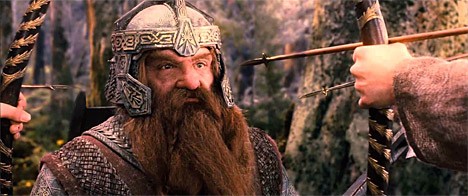Hatred Leads to Blindness
 Letters to My Sons: A Humane Vision for Human Relationships, by Matt Bianco
Letters to My Sons: A Humane Vision for Human Relationships, by Matt Bianco
An excerpt from Letter XII: “Hatred Leads to Blindness.”
Today I was thinking again about Tolkien’s Fellowship of the Ring. Do you remember the scene where the fellowship enters the land of Lothlórien? Gimli is the only dwarf in the fellowship and he is singled out by the elves. Their hatred for the dwarves causes them to see him as an enemy when his labors are with them as a friend.
As a result, they single him out to be treated inhumanely, wanting to blindfold only him as they travel through Lothlórien. He despises the mistreatment and threatens to leave the fellowship and Lothlórien over it. To this, the elves respond that it is too late, and that he will die should he try.
The elves’ hatred for dwarves causes them to see only a caricature of the real Gimli. Truly a friend and an ally, they choose to treat him as an enemy, a criminal. In this, they are wrong and eventually concede the reality of the situation based on the testimony of Elrond, who surely had come to love him. Later, Gimli would look into the eyes of Lady Galadriel and note that he looked “suddenly into the heart of an enemy and saw there love and understanding.”
We can often be guilty of the same behavior ourselves. When we fail to love our neighbors—our enemies, even!—we are susceptible to seeing only caricatures of them rather than the reality of who they are. We see enemies where we should see friends. We see fools where we should see the wise. We see obstacles where we should see shoulders to lean on or needs to be met. We see books, and we are judging them by their covers.
Sometimes we are guilty of such blindness, and we’ve justified it. We argue that we don’t hate the person, we just like him less than others. To make such a mistake, we must first assume that hatred is an emotion opposite of love, a difference of kind, not of degree. From a Christian perspective (which isn’t necessarily to preclude it being the perspective of others as well), hatred is a difference of degree not of kind. To love less is to hate.
In the twenty-ninth chapter of Genesis, Jacob has married Rachel and Leah. Scripture records in verses 30–31:
So Jacob went in to Rachel also, and he loved Rachel more than Leah, and served Laban for another seven years. When the LORD saw that Leah was hated, He opened her womb, but Rachel was barren.
Jacob’s loving Leah less than Rachel is a difference of degree, not kind—a difference that God describes as hatred. Thus, when I use the word hatred, think of it as “loving less.” To hate your neighbor is to love him less. To hate your enemy is to love her less. Less than whom? Less than anyone else—including yourself—excepting the Lord.
In our hatred of others, we do not see who they really are, we see deformed images of them, the results of our imagination. Our loving others less, our indifference toward them, our lukewarmness toward them, are all a kind of blindness that prevents us from seeing in full color, high definition. Instead, we see gray-scale, blurry, snowy pictures that we pretend are the full image.

























